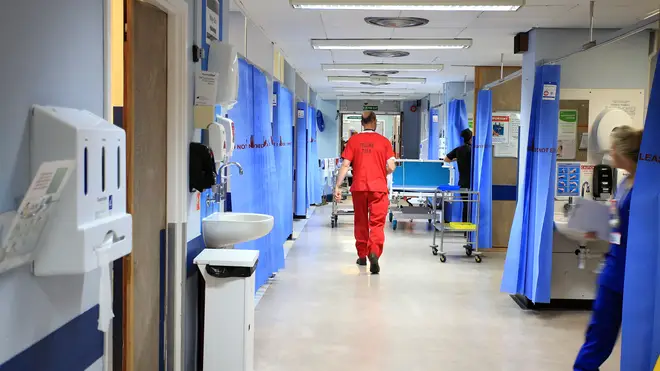
Ben Kentish 10pm - 1am
4 December 2020, 22:30 | Updated: 4 December 2020, 22:42

The UK's four chief medical officers have warned that new coronavirus vaccines will only have a "marginal impact" on hospital numbers over the winter.
Health services should plan for a tough three months between now and the spring, the medical chiefs have said.
In a letter written to colleagues, the four warned that festive gatherings would likely put additional pressure on the NHS and other care services.
The chief medical officer of England, Professor Chris Whitty; of Scotland, Dr Gregor Smith; of Wales, Dr Frank Atherton; and of Northern Ireland, Dr Michael McBride, all signed the letter.
It read: "Winter is always a challenging time for the NHS and wider health and social care service. This year will be especially hard due to Covid-19.
Read more: London 'at risk of Tier 3' as health chiefs urge people to 'stick to rules'
Read more: People in Wales urged not to travel to England to shop and drink

Covid vaccine will be 'really difficult to move around,' warns public health expert
"Although the very welcome news about vaccines means that we can look forward to 2021 with greater optimism, vaccine deployment will have only a marginal impact in reducing numbers coming into the health service with Covid over the next three months.
"The actions and self-discipline of the whole population during lockdowns and other restrictions have helped reduce the peak and in most parts of the four nations hospital numbers are likely to fall over the next few weeks, but not everywhere.
"The social mixing which occurs around Christmas may well put additional pressure on hospitals and general practice in the New Year and we need to be ready for that."
The letter praised health workers for responding "magnificently" to the challenges of the pandemic and stressed the importance of continuing support for others within the profession.
Read more: Covid R rate falls to between 0.8 and 1, the lowest since August
Read more: 'Routine' asymptomatic testing set for Scotland, Sturgeon says

Caller refuses to take vaccine instead of NHS workers
However, it added that it was "essential" the next months were used to learn more about the virus to help inform treatments.
"We do not expect Covid to disappear even once full vaccination has occurred although it will be substantially less important as a cause of mortality and morbidity," the statement continued.
"It is therefore absolutely essential that we use the next months to learn as much as we can as we expect Covid to be less common in the future.
"This will allow us to have the best chance of a strong evidence base for managing it over the coming years."
It comes after GP surgeries were told to be ready to start staffing Covid-19 vaccination centres by 14 December.
In a separate letter sent out across England's primary care networks, NHS England and NHS Improvement warned the "scale and complexity" of the immunisation programme would make it "one of the greatest challenges the NHS has ever faced".
It was signed by Dr Nikita Kanani, medical director for primary care at NHS England and NHS Improvement, and Ed Waller, director of primary care at the same institutions.

This caller told LBC why he thought NHS workers should get the Covid vaccine first
"It is crucial we start to activate local vaccination services to allow priority patient cohorts to start accessing the vaccine," the letter read.
The vaccination sites must be ready to administer 975 doses of the vaccine to priority patients within three-and-a-half days of delivery on 14 December.
Speed is of the essence with the vaccine, as it is usually stored at -70C and will only remain stable at fridge temperatures of between 2C-8C for a limited period of time.
There are 975 doses in each of the Pfizer/BioNTech vaccine packs, which has posed a logistical problem of how they can be broken up and distributed to other key sites such as care homes.
The first to receive the vaccine in the centres will be those aged 80 and over, as long as their other risk factors "clinical or otherwise" had been taken into account.
NHS England and NHS Improvement said the number of vaccination sites in each clinical commissioning group (CCG) area will vary according to the number of residents it has who are over 80.
Listen & subscribe: Global Player | Apple Podcasts | Google Podcasts | Spotify